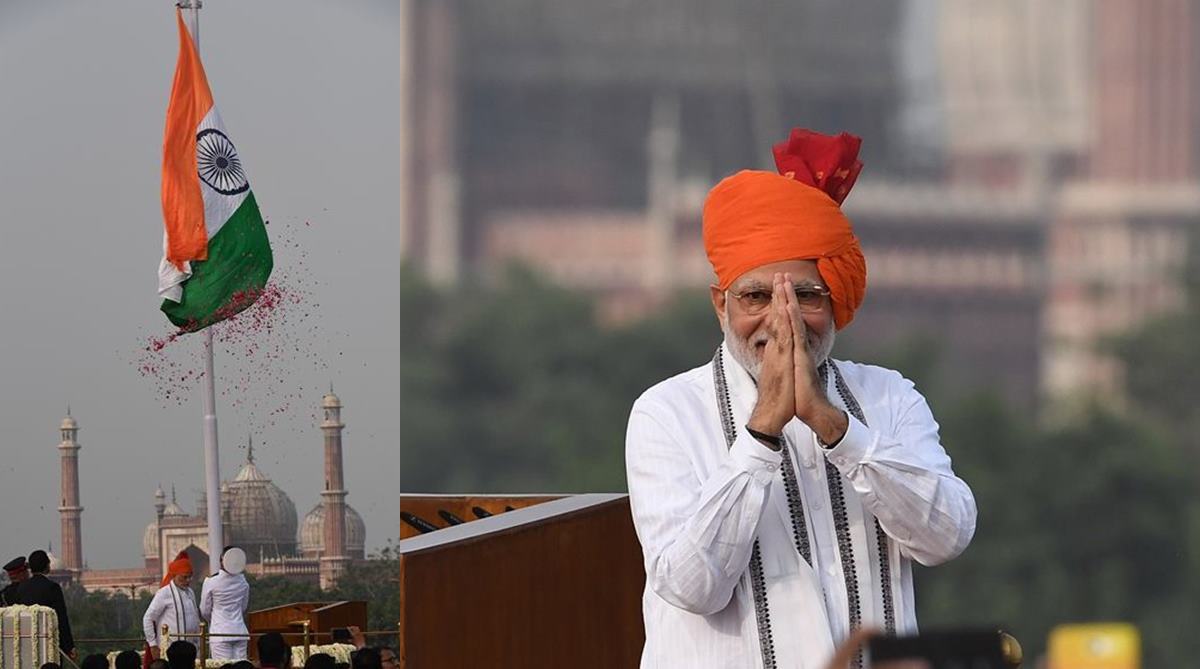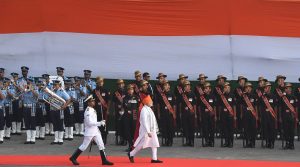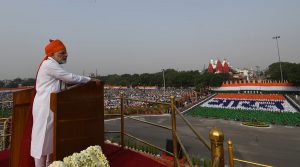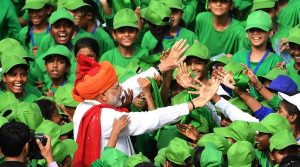A vote for BJP will ensure Tripura’s prosperity: PM to Agartala electorate
Modi claimed that the North East policy of the Congress and the Communists was a Loot East policy, which the BJP buried 10 years back and initiated an Act East Policy.
The PM lists electrification of all villages, 5 crore cleaner cooking gas to poor women, increasded pace of highway construction, record foodgrain production, record mobile phone manufacturing, and building four-time more new houses in villages as some of the achievements of his government

(File Photo: AFP)
It was Narendra Modi’s last Independence Day address ahead of the next Lok Sabha elections. Addressing the nation from the ramparts of the Redt Fort in Delhi, the Prime Minister spoke at length about the progress India had made under his government, and asserted that the country was posed for “record growth”.
In his nearly 90-minute address to the nation, Modi also spoke on the initiatives taken and schemes launched by his government, as he drew a parallel between the “pace of work” during the UPA and NDA regimes.
He said electrifying all villages, providing 5 crore cleaner cooking gas to poor women, doubling the pace of highway construction, record foodgrain production, record mobile phone manufacturing, and building four-time more new houses in villages were some of the achievements of his government.
Advertisement
Independence Day address | India poised for record economic growth: Narendra Modi
Here are some of the highlights from the PM’s 90-minute speech.
Modi said the recent Monsoon Session of Parliament was dedicated to social justice, as measures were taken to protect the interests of Dalits, deprived people, tribals, women and the backward population.
“We have to ensure social justice for all and create an India that is progressing rapidly,” he said.
The PM highlighted his government’s efforts to protect the interests of Dalits and backward classes.
“In a way, this (monsoon) session was completely dedicated to social justice. Whether they be Dalits, exploited, deprived or women, our Parliament with sensitivity and awareness strengthened social justice,” Modi said.
He also referred to his government’s efforts to protect the interests of the OBCs. Modi said a demand to confer constitutional status on the Other Backward Classes was being made for a long time but this was fulfilled by his government during the session.
The PM said the country had become the sixth largest economy in the world, and Indians across the globe were feeling proud.
“The world was worried earlier about India as it saw the country among the fragile five, now it looks at us with hope,” he said.
“The world earlier viewed India as a country hit by policy paralysis, delayed reforms, now it sees it as a multi-trillion dollar investment destination,” he said.
Modi claimed India would be the engine of growth for the world economy for the next three decades, saying the “sleeping elephant” had started to run on the back of structural reforms like GST.
He listed out the pace of reforms in the last four years that he said pulled out the country from being considered a “fragile and risky” economy to the fastest one.
“Prior to 2014, India was likened to policy paralysis and delayed reforms. India was considered among ‘fragile five’ but today the world is seeing it as a destination of multi-billion dollar investment. The narrative has changed,” he said.
The government’s motto, he said, was “reform, perform and transform”.
“Red tape has been replaced with ‘red carpet’,” he said, adding this had boosted India’s place on the ease of doing business ranking.
“We have the potential to take tough decisions. We are not partisan,” he said. “Prior to 2014, global institutions used to say the Indian economy is risky. Today the same institutions and people are saying that reform momentum is giving strength to fundamentals,” the PM said.
He also listed structural reforms like GST, bankruptcy and insolvency law and benami property law that he said helped transform the economy.
An Indian astronaut can go on a space odyssey by 2022 on board ‘Gaganyaan’. “When India celebrates 75th year of Independence in 2022, and if possible even before, an Indian son or daughter will undertake a manned space mission on board ‘Gaganyaan’ carrying the national flag,” said Modi.
After Chandrayaan-1, India’s first lunar probe launched by the Indian Space Research Organisation in October 2008 and operated until August 2009, and Mangalyaan, a space probe orbiting Mars since September 24, 2014, ‘Gaganyaan’ will be India’s third space project.

Prime Minister Narendra Modi announced that his government would launch an ambitious healthcare scheme, Ayushman Bharat, on September 25 this year that would benefit 50 crore citizens of the country.
He said the Pradhan Mantri Jan Arogya Abhiyaan (Ayushman Bharat) would be launched on September 25 on the birth anniversary of Pandit Deendayal Upadhyay.
“The healthcare initiatives of the government will have a positive impact on 50 crore Indians,” he said, adding: “It is essential to ensure that we free the poor of India from the clutches of poverty due to which they cannot afford healthcare.”
Modi called for giving wide publicity to cases in which rapists were awarded the death sentence, saying it would instill fear.
“The more the publicity, the more the fear it will instill in people with demonic mindset,” Modi said.
“The country, our society need to be rid off this demonic mindset,” he said during his Independence Day address from the Red Fort.
“The rule of law is supreme for us and there can be no compromise with this,” he said.
Modi said the society needed to feel a million times more pain a rape victim endures.
He spoke about fast-track trial of rape cases in Madhya Pradesh and Rajasthan where the convicts were condemned to death within days and said such cases need to be given wide publicity to deter people from committing such crimes.
He asked people to inculcate values and respect for women in their children.
The PM said his government was committed to bringing in a law banning the practice of instant triple talaq. He blamed “some people”, in apparent reference to opposition parties like the Congress, for stalling passage of the triple talaq Bill in Parliament.
“The practice of triple talaq has created problems in life of Muslim women … we brought law in Parliament, but some people are not allowing to pass it. I assure you that you would not be let down. I will do all it needs (to bring the law),” he said.
The Bill criminalises the practice of instant triple talaq or talaq-e-biddat and seeks prison term of up to three year for the husbands.
While the Bill has been passed by Lok Sabha, it is pending in Rajya Sabha where the government lacks numbers.

Narendra Modi said his government would not spare corrupt and black money holders, saying efforts had freed corridors of power from brokers, enhanced the number of taxpayers and saved Rs 90,000 crore by eliminating bogus beneficiaries.
Modi thanks taxpayers for their contribution in the development of the country’s economy.
He said nepotism and partisan politics had been eliminated and strict action was being taken against bribery.
“We will not spare the corrupt and those who have stashed black money. They have ruined the country,” he said. “Delhi’s streets are now free from power brokers. From (a time when) the voice of power brokers (was heard), the voice of the poor is (now) heard,” he said.
Modi mentioned the clampdown on 3 lakh shell companies that were used to launder ill-gotten money.
Listing measures that have brought the untaxed in the tax net, he said the number of income taxpayers had increased to 6.75 crore from 3.5-4 crore before 2014.
Also, the implementation of one-nation, one-tax scheme of Goods and Services Tax (GST) has led to a rise in the number of indirect taxpayers from 70 lakh to 1.16 crore.
The PM said the government had eliminated middlemen and bogus beneficiaries by transferring government benefits to those who actually deserved them.
This has led to the elimination of 6 crore bogus beneficiaries who previously cornered subsidised cooking gas LPG, pension, and scholarships, saving Rs 90,000 crore for the exchequer.
He said the country was now celebrating the “festival of honesty”.

Prime Minister Narendra Modi reiterated that his government was on track to achieve the target of doubling farmers’ income by 2022, and said a new agriculture export policy would be unveiled soon to boost farm income.
He spelt out pro-farm measures taken during the four years of his government.
“The demand for higher MSP was pending for years. From farmers to political parties to agriculture experts, everybody was asking about it but nothing happened. We decided that farmers should get 1.5 times more price than their cost of production and implemented the decision,” he said.
The Prime Minister said doubts were cast when he set the target of doubling farm income by 2022 but decisions like increase in price for crops had ensured that the government was on track of meeting the target.
Noting that farmers were facing global markets, he said the government was working on an agriculture export policy in this regard. He, however, did not give details of the policy on the anvil.
“The country is producing record foodgrains. Our granaries are full,” Modi said while highlighting achievements in the farm sector.
Farmers are adopting micro-irrigation, drip irrigation and sprinklers, he said, adding that the government was reviving 99 stuck irrigation projects.
“With a ‘Beej se Bazar Tak’ (helping farmers in getting seeds as well as accessing market) approach, we are bringing a remarkable change in the agriculture sector. The aim is to double farmers’ income by 2022. Today, our entire focus is on bringing transformation and modernising the agriculture sector,” Modi said.
Stating that some people had doubt about achieving the goal of doubling farmers’ income, he said, “Hum makkhan par lakeer nahi, patthar par lakeer kheechane wale hain (decisions taken by us are cast in stone and not on butter)”.
The Prime Minister said the government was promoting value addition to boost the income of farmers.
Modi also spoke about the new avenues farmers were engaging in, such as blue revolution and bee-keeping, as also solar farming.
He said India was currently the second largest fish producer in the world and would soon occupy the top position.
Referring to sugarcane farmers, he said the ethanol production had trebled.
Modi said the government fulfilled the promise to provide 50 per cent more than the cost of production for kharif crops.
(With agency inputs)
Advertisement